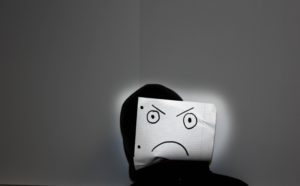What mental health needs is more sunlight, more candor, and more unashamed conversation. —Glenn Close
When we can talk about our feelings, they become less overwhelming, less upsetting, and less scary. —Fred Rogers
If you’re going through hell, keep going. — Winston Churchill
Michelle Obama’s podcast went viral this past week when she revealed what I believe resonates with many people in our world, “I’m dealing with some form of low grade depression.’” I can appreciate the fact that she is working to mind her mental health.

Most days after hours of zooming, video chatting, talking on the phone, ongoing semi-isolation, and weeks of monotony, I hit a wall and take a nap. It is a fatigue and lethargy I’ve rarely encountered. You might say, “So what…? Lots of people take naps.” Well the ‘so what’ is that the last time I took even a weekly nap was probably in 1997. My daughter suggested, “sounds like depression to me.“ I am quite confident I am not clinically depressed.; however, I try to mind my overall mental health.
Pre-pandemic, I typically worked 12 hour days followed by busy weekends. I might sleep late on a weekend, but this current afternoon lull is not that kind of fatigue. As I mentioned 2 weeks ago, I’ve identified grief. Sometimes I wonder if it is more and I do a quick check-in with myself.
dispirited
Michelle went on to cite the origins of her low mood as “the daily strife” of each and every day and called it a “dispiriting” experience. Dis-spiriting. What a thoughtful word.
Dis, prefix: 1. do the opposite of; deprive of; exclude or expel from; 2. opposite of absence of; 3. not.
Spirit, n. 1. an animating or vital spirit held to give life to physical organs; a supernatural being or essence; 3. Temper or disposition of mind or outlook especially when vigorous or animated … you get it.
You got it, too? Well, I’m pretty sure I got it.
As you might imagine, I am always keeping one eye on the mental health issues around me. I have watched, with the odd fascination of a social scientist, numerous videos in which someone “loses it” over, what many people might judge, a minor provocation. Without a micro-analysis of racism, privilege, mental illness, entitlement, or narcissism (which are all worthwhile conversations, too), and without citing any specific examples (because I’m sure you’ve seen plenty), I keep returning to the overly simplistic thought, “Wow. People are super-stressed and they are REALLY not handling it well.”
Dispiriting, indeed—to watch seemingly ordinary Americans behaving badly. I wonder if they are minding their mental health.
Depression?
Depression and anxiety are two of the primary mental disorders that affect people today. Current estimates are 6.7% of Americans (16.2 million) are diagnosed with depression and 18.1% (40 million) with an anxiety disorder. And how would you know if you’re depressed? Some of the basic symptoms of a clinical depression are low mood; the inability to experience pleasure; changes (up or down) in appetite and weight, sleep, and energy (lethargic or keyed up); fatigue; inability to concentrate; and thoughts of death. The key is whether or not someone feels significant distress from the symptoms or if they are functionally impaired.
I’m not suggesting that you diagnose yourself but I also know that if you’re curious, you’ll google the symptoms. And it is important to know what to look for. If you have ongoing concerns that you might have depression, I strongly encourage you to seek professional help. That said, not all depressive episodes look alike and not all warrant treatment with medication. Many types of “talk therapy” are highly effective.
or the covid blues?

My guess is that what Michelle Obama was talking about is not a “clinical depression” but more that sense of feeling “off.” Not an “I can’t get out of the bed” or an “I can’t function” type of persistent depression, but rather an “I feel dulled, bored, somewhat lethargic…not myself” way. Well, as I described about my pre-pandemic life, I’m kind of not myself either currently.
In her podcast, Michelle and her friend, Michele Norris of PBS, go on to talk about many of the strategies for battling the Covid Blues we’ve discussed @MessyMarvelous previously: the importance of keeping a schedule, exercise, getting outside, eating heathy, sharing meals with your household, doing the things you enjoy as you’re able, and so forth… Feeling dispirited would indicate the need to step up the spiritual practices that we may all be further missing. I would add that we need to be spending more time in meditation, reflection, and/or prayer, making more joyful noise (when was the last time you sang aloud—like really loud?), actively reminding ourselves of that for which we are grateful, working on our spiritual aspirations, and any other practice that deeply connects you with the divine or something greater than you.
The Covid Blues feels much like a “failure to thrive.” Click To TweetEven still, that psychological fatigue can linger. I feel it and I hear it all around me: from clients, on social media, from friends, in articles, podcasts, and news reports. Social isolation is unfamiliar to me. My world generally consists of daily contact with groups of people or spending time with individuals hour after hour. What’s happening now feels much more like a “failure to thrive.”
failure to thrive
Failure to thrive was first recognized in the early 20th century as a condition affecting infants living in an orphanage who were dying at an unexpected rate when they were adequately fed and kept clean. The physicians discovered the infants failed to grow and flourish because they weren’t held and comforted. Oddly enough, three symptoms of failure to thrive are irritability, easily fatigued, and excessive sleepiness.
Three symptoms of failure to thrive are irritability, easily fatigued, and excessive sleepiness.
Whew! That sure sounds familiar. From the agitated folks caught on camera to my late afternoon naps. The bottom line is we are built for connection and we are not getting enough of it in our Covid world. The antidote? Hugs.
 Not surprisingly, the New York Times published an interesting article on June 4, about hugging in which the author recommended a safe strategy for hugs during the pandemic. CBS Sunday Morning followed suit and ran a segment on hugging pointing out the fact that we may struggle to thrive with a high degree of physical isolation. Family therapist, Virginia Satir famously emphasized, “we need 4 hugs a day for survival, 8 hugs a day for maintenance, and 12 hugs a day for growth.” Science tells us physical connection is a biological imperative.
Not surprisingly, the New York Times published an interesting article on June 4, about hugging in which the author recommended a safe strategy for hugs during the pandemic. CBS Sunday Morning followed suit and ran a segment on hugging pointing out the fact that we may struggle to thrive with a high degree of physical isolation. Family therapist, Virginia Satir famously emphasized, “we need 4 hugs a day for survival, 8 hugs a day for maintenance, and 12 hugs a day for growth.” Science tells us physical connection is a biological imperative.
Successful hugs
For ade quate psychophysiological benefits, a hug must last longer than 6 seconds at which point we release oxytocin, our nervous system begins to calm, and positive emotions are boosted. To a point, the longer the embrace, the more powerful the effect. You know, a long, strong, heart-to-heart hug. Hospitals and ICUs are beginning to re-evaluate their policies on visitors for patients who are afflicted by Covid as a measure of comfort and to enhance recovery from the virus. Epidemiologists suggest the keys to a successful pandemic hug are for both parties to be masked, move in quickly, and turn your faces in opposite directions. If I was single right now, I would create my own “pod” of other single people specifically for the purpose of sharing daily hugs.
quate psychophysiological benefits, a hug must last longer than 6 seconds at which point we release oxytocin, our nervous system begins to calm, and positive emotions are boosted. To a point, the longer the embrace, the more powerful the effect. You know, a long, strong, heart-to-heart hug. Hospitals and ICUs are beginning to re-evaluate their policies on visitors for patients who are afflicted by Covid as a measure of comfort and to enhance recovery from the virus. Epidemiologists suggest the keys to a successful pandemic hug are for both parties to be masked, move in quickly, and turn your faces in opposite directions. If I was single right now, I would create my own “pod” of other single people specifically for the purpose of sharing daily hugs.
We’re in month six now of the pandemic and apparently the isolation and having our routines disrupted continues on. So keep an eye on yourself. Mind your mental health in these messy times. Practice ways to stay connected to your spiritual life. Find ways to hug those you hold dear. Take care of your marvelous self.
Rhea
 Rhea A. Merck, Ph.D.
Rhea A. Merck, Ph.D.
Licensed Psychologist, persistent woman, mother of 2 amazing young women, writer, teacher, life-long learner, curious & creative human, lover of life, passionate about making life better every day…
visit my outdated website at ramphd.com or email me at [email protected]


